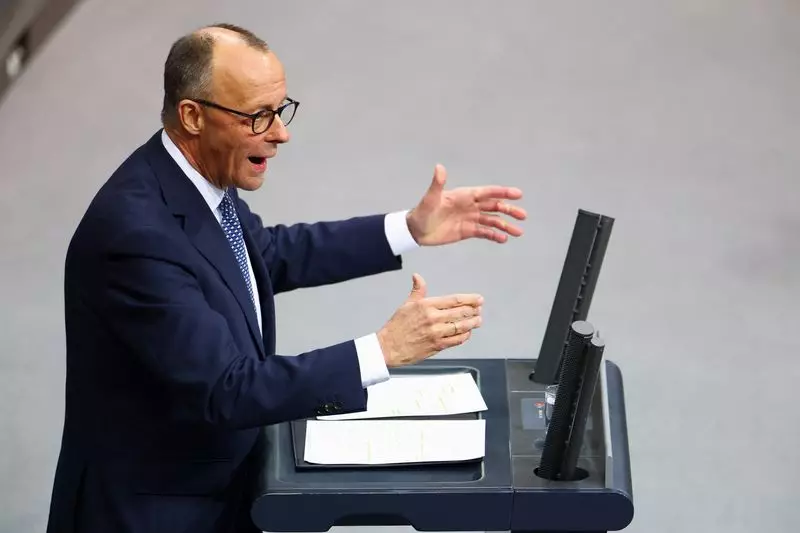As Germany approaches a critical snap election on February 23, the nation finds itself at a pivotal crossroads underscored by significant economic downturns and a growing polarization in political sentiments. The recent collapse of Chancellor Olaf Scholz’s coalition has instigated a race toward the ballot box, allowing various political factions to present their visions for Germany’s future. With the economy inching towards another year of contraction and prevalent concerns about geopolitical stability, particularly regarding the ongoing war in Ukraine, the upcoming election will not only reflect the electorate’s inclinations but also their anxieties about socio-economic conditions.
The political turbulence ensuing from Scholz’s three-party coalition’s failure is noteworthy, constituting a historical moment wherein Germany’s government faces criticism for perceived inefficiency. The ramifications of this collapse highlight a growing discontent among the populace, with many voters viewing Scholz as one of the least popular chancellors in recent memory. The conservative Christian Democratic Union (CDU), led by Friedrich Merz, has started to solidify its position as a credible alternative amid these uncertainties, stirring a debate over how best to navigate Germany’s economic distress while countering the far-right’s rising influence.
The election not only poses a referendum on political direction but also on economic policy. With threats looming over established industrial giants, particularly in the automotive sector, the CDU’s promise of tax cuts and lower energy prices has garnered attention. However, while these proposals aim to incite economic growth, they come with the caveat of adhering to Germany’s constitutionally mandated spending limits, known as the “debt brake.” This has led to criticisms that the cap may stifle necessary investment during a time when innovation and growth are crucial.
Economic Strategies: Diverging Paths to Recovery
In stark contrast, the Social Democrats (SPD) have acknowledged the limitations imposed by the debt brake and advocate reforming it to bolster economic recovery. Their strategy includes launching an off-budget fund aimed at infrastructural modernization and facilitating private investments, encapsulated by their proposal for a “Made in Germany” premium. This represents an attempt to harness the spirit of innovation while ensuring domestic products play a significant role in economic resurgence.
Despite these contrasting plans, both parties recognize the imperative to revitalize the German economy from its current stagnation. The impending challenge lies in translating these proposals into actionable legislation while maintaining a united front against the disturbing rise of the far-right Alternative for Germany (AfD) party, which has begun to capture a significant portion of the public’s support by appealing to nationalistic sentiments and economic uncertainty.
As the campaign heats up, opinions on sensitive topics, such as the war in Ukraine, highlight the divisions among political parties. Scholz’s government has committed substantial resources toward military aid for Ukraine, positioning Germany as a critical player in the geopolitical landscape. However, the CDU’s call for an escalated defense posture through advanced weaponry implies a potential shift toward a more aggressive military stance. Merz’s willingness to advocate for missile supplies underscores the delicate balance Germany must strike between supporting allies and avoiding direct confrontation with Russia.
In stark opposition, the AfD’s platform calls for an abrupt withdrawal from military involvement and the reestablishment of diplomatic ties with Moscow. This perspective, while garnering support among voters disillusioned with international obligations, raises questions about Germany’s role in global affairs and its commitment to European security.
The Migration Dilemma: From Welcome to Restriction
Immigration policies have also shifted dramatically since the welcoming stance taken during the 2015 refugee crisis. Current proposals from the CDU focus on stringent border controls and the processing of asylum claims in third-party countries. This stark pivot illustrates a not-so-hidden concern within the electorate regarding migration and its perceived impact on social cohesion and economic resources. As public sentiment evolves, parties must navigate the intricate dynamics of immigration while addressing underlying economic and humanitarian issues.
As Germany embarks on a critical election period, it becomes evident that the political and economic futures are intricately linked. The outcomes of these electoral battles will likely not only define the immediate policies of the next government but will also set the tone for Germany’s long-term social and economic landscape amidst rising extremism and global uncertainty. The nation stands at a precipice, with its choices echoing beyond its borders in a time of unprecedented challenges.

